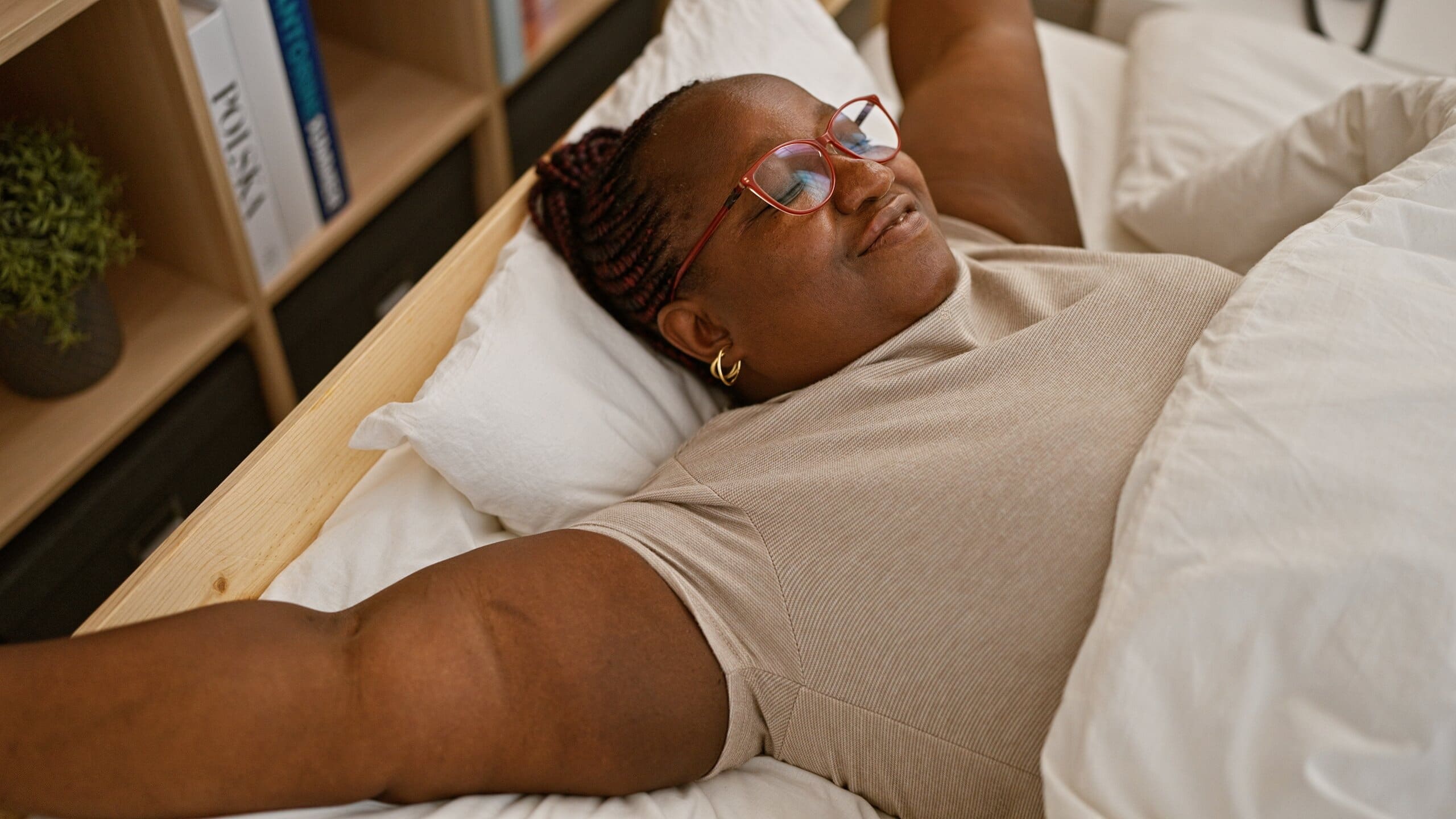There are plenty of reasons you might be feeling groggy and out of sorts thanks to a run of bad nights' sleep, from daylight savings time messing with your internal body clock, to jet lag and general sleep deprivation. There are plenty of ways we can knock our circadian rhythm out of sync, which begs the question: What's the best way to reset your body clock to a normal sleeping pattern?
Well, as it turns out, resetting your circadian rhythm is a pretty simple task, and could take as little as 3 nights to do, provided you’re willing to put the effort in to get some high-quality sleep that aligns your internal body clock with your preferred wake-up time.
So, to give you a hand in this area and make sure you’re ready for the week ahead, we’ve broken down our 3-day process on how to reset your body clock fast over the weekend so that you’re up on time and raring to go when work rolls around!

How to reset your body clock: Day 1
Day of the week – Saturday
Wake-up time – 10am
Bedtime – 11pm
If you’re looking to reset your body clock over the weekend, then there’s really no better way to begin than with a lazy Saturday morning!
Waking up at 10am should give you plenty of time to catch up on lost sleep from the week (or from indulging in a late Friday night), and a bedtime of 11pm means you have pretty much the whole day beforehand to kick back and relax.
However, vegetating for 13 hours straight is not the best way to improve your sleep quality, and you run the risk of sleeping too much, which is why we recommend you try to do all of the following during your Saturday once you get out of bed. This will put you in a better position for getting up a bit earlier on Sunday, too.
1. Complete a 30-minute workout in the morning
At this point, it should not shock you to learn that countless studies have shown a deep link between the benefits of regular exercise and getting better sleep, so establishing a good exercise routine will absolutely help to improve both your sleep quality and duration overall.
Of course, we’re not saying you have to start rigidly exercising for an hour every day straight away but finding a way to make time for a 30-minute workout after getting up will put you in the right frame of mind for the day ahead.
So, whether through cardio or strength training, do something you know you’ll enjoy and get your blood pumping – you never know, you might just find it’s the first step towards a new hobby.
2. Drink at least 2 litres of water
Regardless of how much exercise you’re doing, proper hydration is absolutely essential for maintaining high energy levels and getting rid of any mental fog you might be experiencing. And yet, many of us neglect this basic daily necessity.
So, in light of this, make sure you drink a minimum of two litres of water over the course of the day. This will keep your mind sharp, boost your metabolism, and offset any sleepiness you may be feeling in the afternoon. In fact, a cold glass of water is a great way to feel awake fast.
3. Get correct light exposure
Light is quite possibly the most important external factor that affects sleep, and it plays a central role in regulating our body’s internal clock, sleep cycles, and circadian rhythm. Essentially, light signals to us when to be alert and when to rest, and getting too much light at the wrong time can change when we start to feel tired.
This is why it’s important to expose yourself to natural sunlight and bright light in the morning and throughout the day before switching to dimmer lighting in the evening once the sun starts to set, as doing so will help to properly regulate sleep hormone production.
Naturally, as part of this process, you should look to limit phone use in the lead-up to bedtime, otherwise, the blue light emitted on your phone screen can trick your mind into thinking that it's daytime despite it being dark outside.
However, if you do have to use your phone, then make use of the night mode feature in the run-up to bed to minimise the impact it might have on your sleep-wake cycle.
4. Try a cognitive shuffle
Finally, if you’ve settled into bed on time and your mind is still wide awake, we recommend trying what’s known as a cognitive shuffle to tire it out and stop any thoughts racing around your head.
As simple as continually thinking of random, easily imagined items in your head, a cognitive shuffle like this forces your brain to exert what energy it has left into a mundane task, which should hopefully speed you on towards deep and restful sleep. It's the perfect activity to incorporate into your bedtime routine.

How to reset your body clock: Day 2
Day of the week – Sunday
Wake-up time – 8am
Bedtime – 11pm
Hitting day two of your body clock reset routine, your long lie in on Saturday should hopefully have caught you up on the majority of the sleep you’ve been behind on, hence why you’re waking up much earlier on Sunday – while still having a solid 9 hours in bed!
Again, like Saturday, the goal of your Sunday is to unwind and relax while continuing to prep your body for a slightly earlier bedtime during the week. And that means adding in a few new elements to your day on top of what you did on Saturday to help re-regulate your body’s internal clock:
1. Open your curtains when you wake
Now, obviously, we all open up our curtains when we wake up in the morning. However, if you really want to wake up quickly, then you should open them as soon as possible after getting out of bed – ideally straight after getting dressed.
Doing this will expose you to as much natural light as possible in the morning, and if you’re still a little tired after your relatively early alarm, it should help you wake up faster by signalling your brain to stop producing the sleep hormone, melatonin.
2. Go for a walk
Similarly to the 30-minute workout you did on Saturday, doing a follow-up workout outside or taking a short walk will expose you to further natural light levels and help to increase your body’s vitamin D intake.
Boosting how much vitamin D your body gets is essential for preventing vitamin D deficiency, which can cause lethargy and disrupt your sleep, so you should get outside for a little bit every day to stimulate its production. And, if the weather outside is cold and wet, you can always take a vitamin D supplement instead to keep your levels topped up.
3. Take a nap if you’re tired
When done right, there are plenty of benefits to taking a nap (and it’s probably why so many cultures around the world are known for it). From reducing a sense of fatigue to increasing alertness and improving your mood, a quick 10-20 minutes can completely revitalise your day!
However, for a nap to be beneficial, there’s a science to it. Firstly, you don’t want to sleep for more than 20 minutes, as anything longer could risk your body entering a deep sleep cycle.
On top of this, you also need to time your nap correctly. Pay attention to when you get tired in the day or feel a dip in alertness and then nap straight away (if possible) – so long as this is at least 8 hours before your bedtime, it shouldn’t impact your nighttime sleep.
4. Cut out the alcohol
Although many of us might enjoy a glass of wine or two with our Sunday lunch or dinner, if you really want to ensure you’re getting the best sleep possible, you should avoid touching any alcohol until your circadian rhythm has sorted itself out.
Whilst alcohol can make you feel sleepy due to its sedative properties, and technically help you to fall asleep more quickly, any alcohol directly affects sleep quality. Research shows that people who drink before bed are far more likely to experience disruptions later in their sleep cycle and could feel sleepier during the day.
So, if you can avoid it, don’t indulge in that pint of beer or glass of red, no matter how tempting it might be.

How to reset your body clock: Day 3
Day of the week – Monday
Wake-up time – 6 or 7am (depending on when you normally wake up for work)
Bedtime – 10pm
Alright, with the weekend over, your body clock should be close to settling back into its normal rhythm, meaning all that’s left to do on day 3 is to maintain this conscious approach towards rising early and getting up and about straight away.
In theory, you should start naturally waking up at your preferred wake-up time for the rest of the week. But even if you’re still feeling a touch sleepy today, stick to your new sleep-wake times until your body is used to it – worst comes to worst you can always take an extra hour over the weekend to catch up on any remaining sleep you feel you need.
And, of course, like on the weekend, here are a few tips you can follow during the week to help you feel energised throughout the day:
1. Make sure you eat breakfast
Like sleep and exercise, research has repeatedly shown that your diet and sleep quality are directly linked, meaning that a poor diet can cause worse sleep overall. Therefore, if you want to really promote good sleep going forward, you should look to eat breakfast every day – either when you get up or once you get to work.
Naturally, what you have for breakfast is up to you, but we’d recommend something offering a balance between proteins, complex carbs, and healthy fats, such as those provided by yoghurts, berries, nuts, and lean proteins.
2. Avoid caffeine after lunch
Whilst caffeine can absolutely provide a short-term energy boost (and who doesn’t enjoy a cup of coffee as they sit down to start work), it can take your body a surprisingly long time to break it down – especially if you’re having more than one cup of coffee a day.
For most people, it takes an average of 5 hours to eliminate roughly half the amount of caffeine found in one cup of coffee, meaning if you have a cup of coffee at 9am, you’ll still have plenty of caffeine in your system by 2pm.
So, to avoid being wired as you go to bed, it’s best to avoid drinking caffeine after lunchtime, or at the very latest, 5 hours before bed, while sticking to a maximum of two cups a day – otherwise you’ll be wide awake come bedtime.
3. Create a winding-down routine
No matter how much you love your job, everyone can find work stressful from time to time. And when you’re stressed or anxious, your body produces more of the stress hormone, cortisol, which makes you more alert and thus keeps you awake.
This is what makes establishing a winding-down routine so important, as calming activities before bed can reduce cortisol levels and settle any anxious thoughts you might have. From yoga to stretching, meditating to deep breathing, journaling, or even having a hot bath, find an activity that helps to relax you and work it into your evening routine.

Improve your sleep with MattressNextDay
And with day 3 complete, that’s it! You should have a reset body clock and be back on track for getting those essential 8 hours of rest every night going forward!
Of course, everyone is a bit different, so there’s no guarantee that our 3-day strategy will completely reset your body clock come Monday morning – but you should at least be feeling more alert and closer to the regular sleeping pattern you want to maintain.
However, changing your sleeping pattern won’t count for much if your bed and mattress are hindering your sleep. And if this is the case, then why not check out the MattressNextDay range today?
With mattresses and beds of all sizes and firmness options available from top UK brands, there’s something for everyone in our collection. Start browsing today to find your new bed and don’t forget to visit our sleep hub for more insightful sleep articles like this one!






